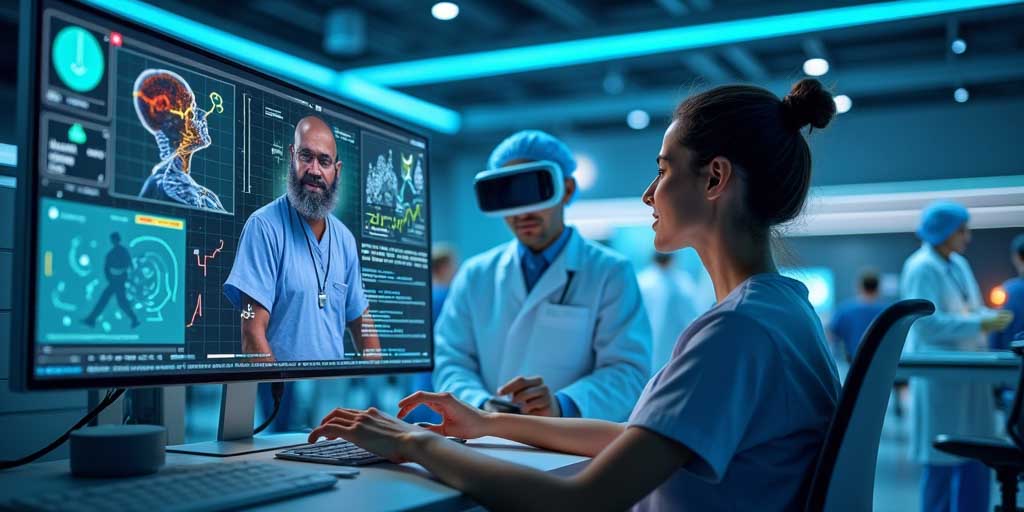How 2025’s Top Healthcare Innovations Are Redefining Patient Experiences
The landscape of healthcare is undergoing a transformative shift, with 2025 marking a pivotal year in the integration of technology and patient care. Innovations in healthcare are not just improving medical outcomes but are also dramatically enhancing the patient experience. This post explores some of the groundbreaking technologies and methods that are setting new standards for how care is delivered and experienced by patients.
Telehealth: Bridging the Gap Between Patients and Providers
One of the most significant advancements in recent years has been the widespread adoption of telehealth services. Telehealth has evolved from a convenience to a necessity, largely driven by the needs that emerged during the COVID-19 pandemic. In 2025, telehealth platforms have become more robust, offering not just video consultations but also integrated care solutions. These platforms now include features like real-time health monitoring, AI-driven diagnostics, and personalized health reminders, making healthcare more accessible and reducing the need for physical clinic visits.
Personalized Medicine: Tailored Treatments Enhancing Efficacy
The field of personalized medicine has made leaps and bounds by 2025, largely thanks to advancements in genetic testing and biotechnology. Patients can now receive treatments that are highly tailored to their genetic makeup, improving the effectiveness of treatments and reducing side effects. For instance, oncology has seen significant improvements with therapies that are designed to target specific mutations in cancer cells, leading to higher recovery rates and improved quality of life for patients.
Wearable Health Technology: Continuous Care and Monitoring
Wearable technologies have transcended beyond fitness trackers to sophisticated health monitoring devices capable of detecting various health conditions before they become severe. Devices in 2025 can monitor everything from blood sugar levels to neurological activity, providing data that can preemptively alert healthcare providers to potential health issues. For example, wearable ECG monitors can detect arrhythmias early, and new skin patches are capable of monitoring hydration levels and vitamin deficiencies, offering a continuous way to manage health.
AI and Machine Learning: Revolutionizing Diagnosis and Treatment Plans
Artificial intelligence (AI) has transformed the diagnostic process, making it faster and more accurate. In 2025, AI algorithms are used to analyze medical imaging, predict patient risks, and even suggest customized treatment plans. This use of AI not only speeds up the diagnostic process but also reduces human error, leading to better patient outcomes. AI’s role in managing chronic diseases is also noteworthy, with smart algorithms able to suggest lifestyle adjustments and medication changes in real-time based on data collected from various health tech devices.
Virtual Reality (VR) and Augmented Reality (AR): Enhancing Patient Understanding and Training
Virtual reality and augmented reality technologies have found a valuable place in patient education and the training of healthcare professionals. VR simulations allow patients to understand their conditions and treatments in a fully immersive environment, which improves their engagement and compliance with treatment protocols. For healthcare providers, AR overlays provide real-time data during procedures, enhancing precision and safety during surgeries and other treatments.
Blockchain for Health Data Security and Sharing
With the increased digitization of health records, maintaining data security and privacy is paramount. Blockchain technology offers a robust solution by creating decentralized and tamper-proof data records. In 2025, blockchain is widely used not just to secure medical records but also to facilitate the seamless sharing of patient data among providers, ensuring that irrespective of the location, healthcare providers have access to accurate and complete patient history.
Conclusion: The Future Is Here
The innovations in healthcare by 2025 are not just futuristic concepts but are real, tangible technologies that are redefining how patients experience healthcare. From AI and telehealth to wearable technologies and personalized medicine, the focus has clearly shifted towards making healthcare more accessible, personalized, and efficient.
As these technologies continue to evolve, the future of healthcare looks promising, with patient outcomes and experiences at the forefront of this evolution. The integration of these innovations not only promises better health management but also empowers patients to take an active role in their health journey, marking a new era in the healthcare industry.
